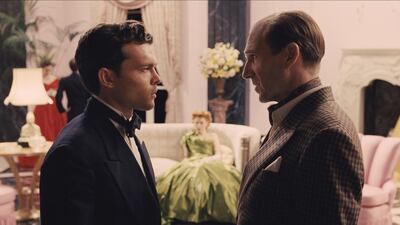Hail, Caesar!
Director: Joel Coen, Ethan Coen
Starring: George Clooney, Josh Brolin, Alden Ehrenreich, Tilda Swinton, Scarlett Johansson
Four stars
The Coen canon reaches a crescendo – or a warped inversion of one – in Hail, Caesar! when the brothers assemble a quartet of religious leaders from various faiths in front of Josh Brolin's 1950s movie studio "fixer" Eddie Mannix.
He is looking for their seal of approval for his studio’s latest Bible epic, a sword-and-sandals movie starring dim-witted actor Baird Whitlock (George Clooney, looking particularly well-suited to golden-age Hollywood).
The question of how God should be portrayed in the film has been put off. An early cut of the movie leaves a tiny gap filled by a caption that reads “Divine presence to be shot”. This is something of a summation of Joel and Ethan Coen’s films: meaning is a missing frame, human folly is the star and only the dialogue is divine.
Hail, Caesar! is by no means their best, but it is in some ways the Coens' most essential film. Having long made playthings of old movie genres, their romp through vintage Hollywood here is literal. It is a loving satire and merciless ode to moviemaking, where hapless souls serve no higher power than the Hollywood machine.
Their main character is the stone-faced, fedora-wearing Mannix, a bruising studio executive who keeps the assembly line humming and its contracted stars out of the gossip pages.
He is based on the real figure of the same name who ruthlessly toiled for Louis B Mayer’s MGM. Brolin’s Mannix, though, is a family man, trying to quit smoking and making constant guilt-ridden trips to his priest to confess.
Among his orders from above is to squeeze Western star, and genuine cowboy, Hobie Doyle (newcomer Alden Ehrenreich, who steals the movie with some of the best bad-actor acting you have ever seen) into making Merrily We Dance, a prestige drama from director Laurence Laurentz (a terrific Ralph Fiennes), whose directions – such as to give "a mirthless chuckle" – confound Doyle.
The gulf between the on-screen fiction and off-screen reality for the fictional actors is comically vast, not least for star DeeAnna Moran (Scarlett Johansson).
She is having a child of unknown paternity – another crisis for Mannix to manage. Meanwhile twin-sister gossip columnists (both of whom are played by Tilda Swinton) are threatening to report something ominous about Whitlock, and aviation firm Lockheed is trying to lure Mannix away from Tinsel Town.
But his biggest problem is finding Whitlock, who has been kidnapped by a group of communist screenwriters who call themselves "The Future". This is the main thread of the film – but Hail, Caesar! isn't much occupied with main threads. There's too much fun to be had.
Let loose on a 1951 backlot, the Coens find a feast of satire and movie references that come almost too easily to them, and Hail, Caesar! slides toward becoming more a parade of inspired parodies than one of their more closely stitched odysseys.
Whatever strong-armed, money-driven system spawns such gleeful absurdity can't be all bad. So when Mannix, with shades of Ned Beatty in Network, tells Whitlock: "You have worth if you serve the picture!," there is, naturally, irony.
But there’s also affection. As suggested by his rival job offer (a Lockheed headhunter flashes a picture of an atom-bomb test), there are worse things to believe in.
• Hail, Caesar! is in cinemas now

